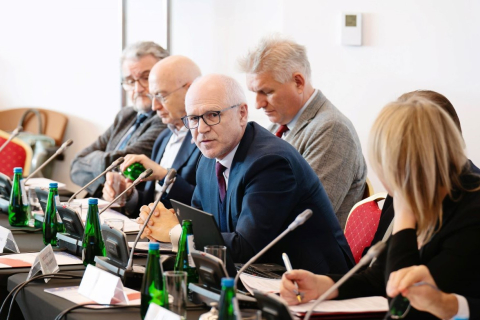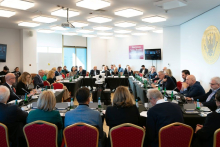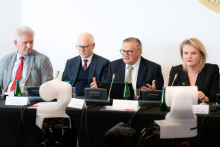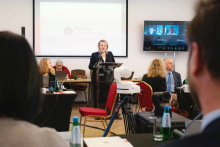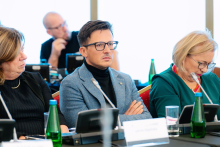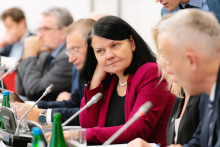- Let's find in Europe such tools, such health-promoting programs that give a chance for effectiveness - said Prof. Bolesław Samoliński, Head of the Department of Public and Environmental Health and the Department of Prevention of Environmental Hazards, Allergology and Immunology MUW, at the opening of the conference of the ‘Road to the Presidency’ series, dedicated to Poland's health priorities during our country's presidency of the Council of the European Union (EU), which begins in January.
This was the third meeting jointly organized by the Institute for the Development of Social Affairs and the Medical Center of the Medical University of Warsaw regarding prevention and public health. Previous conferences, held at MC MUW under the slogan “Road to the Presidency,” focused on the mental health of children and adolescents as well as digitization in health care, which are also health priorities of the upcoming Polish presidency of the EU Council. Each of the meetings was attended by leading experts in medicine and health care, as well as policymakers and representatives of community organizations.
The discussion on prevention took place on Friday, December 13, 2024, at the Main Library of the Medical University of Warsaw. Its participants considered whether preventive health care, in its broadest sense, could be a Polish export commodity, and which aspects of it our country can already boast about in the EU, and which require further work and improvements.
Health security vs. national security
At the beginning of the conference, the president of the Institute for the Development of Social Affairs and member of the European Economic and Social Committee, Małgorzata Bogusz, noted that health security is not an issue that only health professionals should be interested in.
- The Polish presidency sets seven strategic pillars of security: military, informational, energetic, economic, nutritional, civilian and healthcare. These areas do not function in isolation - they form a system of interconnected vessels. Health security, which we will also discuss today, is the best example of this. A recent report commissioned by the European Commission and authored by former Finnish President Sauli Väinämö Niinistö, titled “Strength Europe and Military Preparedness and Readiness,” makes it clear that health security is a fundamental element of European strategic resilience. (...) Recent years - the COVID-19 pandemic, the situation across Poland's eastern border - show how public health is intertwined with other dimensions of state security.
Prof. Rafal Krenke, Rector of MUW, added that the COVID-19 pandemic and the war in Ukraine had a key impact on the increase in our country's spending on prevention. The challenge facing the EU, however, is to balance the amount of money allocated for this purpose between member countries.
- Outlays on preventive medicine (...) increased dramatically in the COVID-19 pandemic situation, and it was a colossal increase of about 88 percent. But looking at EU data and keeping in mind the principle that a group is only as strong as its weakest link, we see huge differences in the EU when it comes to spending on preventive medicine: Austria spends 1.5 percent of GDP on it, while Poland spends 0.14 percent (...). Only 14 countries spend more than 100 euros per capita on prevention.
Primary and secondary prevention
Wojciech Konieczny, Undersecretary of State at the Ministry of Health, stressed that all the problems that Poland has listed as priorities during its presidency of the EU Council are related to prevention.
- You can even say that about the priority of digitization, because it's about both the opportunities and the risks that new technologies bring (...). We have a number of different preventive measures: primary, and even earlier, at the genetic stage, and secondary, that is, simply taking care of a healthy lifestyle. In turn, the effectiveness of each of them in population terms depends on this promotion. And there are countries where the promotion of prevention is at a higher level than in our country. They achieve results in areas where we have not achieved them in recent years: examples are the fight against overweight or nicotine use (...). That is why we have raised the profile of this promotion precisely to a priority of the EU Council Presidency.
The discussion was attended by specialists in various fields of medicine, who informed about the most important achievements and challenges they face in the field of prevention in their daily scientific and medical work. Prof. Małgorzata Myśliwiec, Head of the Department of Pediatrics, Diabetology and Endocrinology of the Faculty of Medicine at the Medical University of Gdańsk, referred to screening for familial hypercholesterolemia, which may already enter the six-year-old checkup early next year.
- Early detection of this disease allows us to implement appropriate treatment in children, and since it is an autosomal dominant, inherited disease, we detect it in the parent at the same time. A very good opinion for screening in this direction has been issued by the Agency for the Assessment of Medical Technologies and Tarification, and this has already been processed by the Ministry of Health.
Prof. Myśliwiec disclosed that she is now making efforts to include early detection of type 1 diabetes in health services, as the incidence is growing rapidly among Polish children. Screening would catch the presence of antibodies typical of stage one and two diabetes, which in turn would lead to rapid implementation of biological treatment and recommended lifestyle changes.
Preventive measures in cardiology
The request for joint preventive measures for cardiology and oncology was made by Prof. Janina Stępińska, Director of the National Institute of Cardiology.
- We are fortunate to have common risk factors (...). As part of the National Cardiovascular Disease Program, which will run until 2032, we have prepared ten rules for the heart, which can actually be ten rules for health. Together we can do a lot.
According to Prof. Stępińska, the Polish export commodity in the field of cardiology should be the KOS-Infarction program:
- It showed that early rehabilitation significantly reduces mortality, increases the possibility of returning to work, and improves quality of life.
Prof. Marek Pustuła, Chair and Department of Experimental and Clinical Pharmacology at the Medical University of Warsaw and member of the Polish Society of Longevity Medicine, spoke about the fight against nicotine abuse.
- We should be looking at what is happening in the world, first and foremost in terms of responding to nicotinism in children and adolescents (...). Unfortunately, we are witnessing that many nicotine-containing products available on the market are beyond our legislative control. First - the composition of these products, second - their quality, and third - their availability. There is no legislation to regulate this.
The expert stressed that this must change, since all EU countries are obliged to reduce smoking prevalence to 5 percent for adults by 2040, but so far only Sweden has succeeded.
- Poland has this rate at 30 percent (...). We need to think about solutions that are primarily economic. The European Society of Cardiology has repeatedly emphasized in its guidelines, preventive ones for instance, that only economics will force us to quit smoking.
The issue of vaccination
Prof. Robert Flisiak, Head of the Department of Infectious Diseases and Hepatology at the Medical University of Białystok and President of the Polish Society of Epidemiologists and Doctors of Infectious Diseases, noted that Poland should try to return to the position of prevention leadership it held several decades ago.
- Forty years ago there were vaccination programs in our country, which were used en masse. (...). Thirty years ago we could show not only Europe, but the whole world, how to implement an effective HIV prevention, diagnosis and treatment program. Ten years ago we were in the introduction of a treatment program for HCV infection (...). Today, there are few conditions that have well-documented effectiveness with proper preventive management (...) with all due respect to cardiology, which actually has something to boast about.
“Syndromic” monitoring
A presentation on the most important challenges in prevention was shown by Chief Sanitary Inspector Dr. Paweł Grzesiowski. According to him, in a globalized world, which faces, for example, huge migratory movements, “syndromic” monitoring of diseases is very important.
- We need to realize that our capabilities today, i.e. the classic form of monitoring, which consists of passively writing down cases recorded by doctors in hospitals or in the primary health care (POZ), is not the answer to the modern world (...). We need to strengthen those forms of monitoring that will allow us to determine whether an event has occurred that could be a disease - our services should step into the role of public health investigators. Syndromic monitoring is not about determining whether someone has caught a virus, but about observing whether, for example, we are recording more cases of diarrhea or pneumonia, and if so, what this is due to. Today, the diagnosis of the cause of death often does not correlate with the root cause of the severe condition that led to death. (....) The approach needs to change. This monitoring has to be proactive - that is, we are the ones who have to look for cases and collect the data that is in the health care system, rather than waiting for a doctor to report something to us on a Board of Communal Housing Resources (ZKZL) form or some other.
Dr. Grzesiowski notified that the Chief Sanitary Inspectorate (GIS) is already trying to enter into cooperation on such terms with the National Health Fund. He added that cross-border data exchange is crucial, because by receiving one million migrants from Ukraine, Poland should already know the health problems of the community there.
- The World Health Organization or UNICEF are pushing very hard for precisely this element, namely early warning systems. They can provide data before an epidemic or even a pandemic develops. This gives us a chance to act early and stop or at least mitigate the effects of such an event.
Health education in schools
Among the attendees there were also representatives of the social side. Kamila Kadzidłowska from the Parents for the Climate organization positively assessed the plan to introduce the subject of health education in schools, but stressed that instilling healthy habits in the young generation cannot be reduced to a single class in the school schedule.
- We have made a number of requests to the team creating the health education program (...) the idea is to include air quality issues, nutrition issues, but also the issue of educating the staff of educational institutions as well as childcare centers, including, for example, canteen intenders (...). For this health education to make sense, children can't just learn about healthy eating and then not be exposed to healthy food either at home or at the school canteen. This also applies to green prescriptions, i.e. the health benefits of time spent outdoors, in contact with nature.
Evaluating the effectiveness of EU programs
The meeting was summarized by the Undersecretary of State at the Ministry of Health Katarzyna Kacperczyk, who coordinates, among other things, the work of the Department of International Cooperation. According to her, the Polish presidency of the EU Council will be an opportunity to demonstrate not only good practices, but also professionals whose work has contributed to Poland's achievements in the field of prevention.
- We have an ambition to be tempted to analyze and share the experience of EU countries in evaluating the effectiveness of prevention programs and, more broadly, prevention instruments (...) we would like to do a review of EU programs to assess which instruments actually work. (...). Because prevention is education, but also the availability of solutions - actual and economical - and we will be addressing these topics during our presidency. We have also agreed with the European Commission and the member states that in the context of the threat of cancer and cardiovascular diseases, during the first meeting of the EU Council there will be a discussion on the revision of the tobacco directive (...) Although the work will not begin during our presidency, because it is quite a complicated topic.
Katarzyna Kacperczyk noted that the implementation of the legislative package on the European Health Data Space will fall during the Polish presidency of the EU Council.
- This is a particularly important moment, because the institutional architecture of the system will then take shape both at the national and EU levels. We have a very rich experience in the field of digitization, and we have the ambition to present it.
The Polish presidency of the EU Council begins on January 1, 2025. Our country will form the presidency trio together with Denmark and Cyprus (as it did for the first-ever Polish presidency in the second half of 2011). The slogan accompanying the Polish presidency of the EU Council is “Security, Europe!”
Source: IRSS
